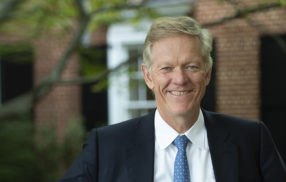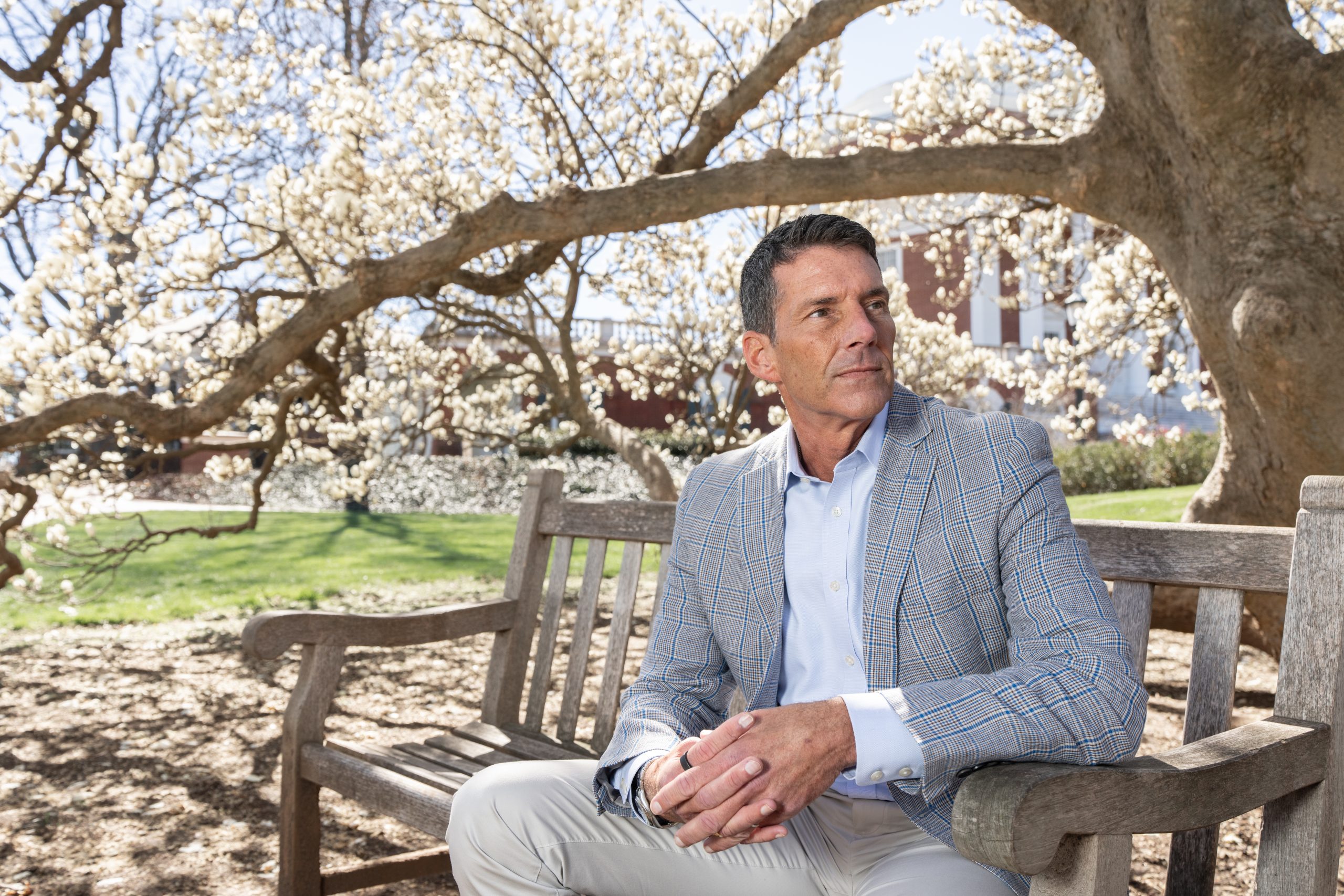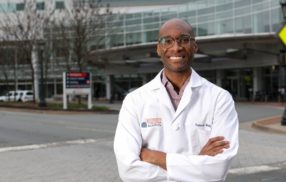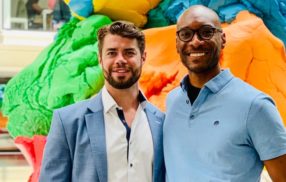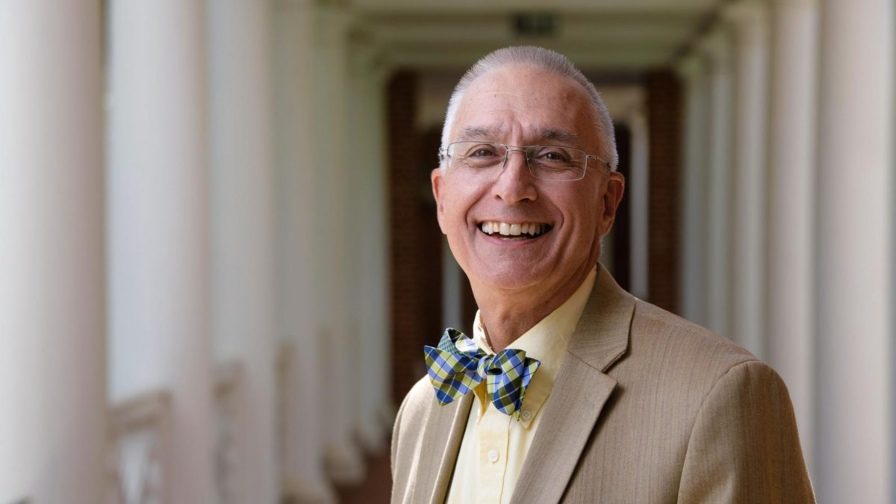
‘The Most Amazing Thing I Have Ever Seen’: Darden Alumnus Dr. Paul Matherne on UVA Health’s Rapid Response to COVID-19
By Dave Hendrick
Like most people, Dr. Paul Matherne (EMBA ’10) has seen his professional environment change dramatically in recent months. As interim senior associate dean for clinical affairs at UVA Health, Matherne helped to rapidly transform the health system to prepare for the growing coronavirus pandemic. As a practicing pediatric cardiologist, he also had his own patients to consider. UVA Health has so far weathered the pandemic while maintaining necessary levels of capacity and supplies, but the changes brought about by the crisis have been significant and may be long-lived.
Matherne, who teaches health care courses at the University of Virginia Darden School of Business and will soon co-teach a course in the Executive MBA program on how the pandemic is impacting business, spoke in late April about the dynamic environment at the health system and how his Darden Executive MBA experience has helped inform his approach.
Can you describe the changes you have seen at work?
In the health care system, we had to rethink almost everything we did. How are we going to deliver nonurgent care via telemedicine? How are we going to deliver urgent care in a safe manner? How are we going to protect our staff? How are we going to source personal protective equipment (PPE) when the supply chain is so disrupted?
Whatever was a ridiculous idea yesterday, sometimes became the only course of action today.
We had to suspend many of our standard processes while focusing on the safety of our patients and our staff. We had to start thinking differently, which can be a challenge in a very standardized environment such as health care.
One of the most profound things we did was to make rapid decisions with diverse stakeholders. We needed a contract to get a telemedicine platform set up that would have taken three months in the old days, and we literally had it done in 48 hours. This required new thinking on the university side and on the industry side. People were now willing to say, “We know what we used to do and we don’t have time for that. This is what we’re going to do.”
In addition, the challenges of caring for COVID-19 patients required new procedures and processes and lots of PPE. Another huge obstacle was the difficulty in determining who actually had COVID-19. With only limited testing, we were working in the dark, but fortunately, in one of the most heroic examples of ingenuity, Dr. Amy Mathers and our lab developed in-house testing for COVID-19.
In a remarkable display of teamwork and resilience that could almost be described as a miracle, within two weeks, they had testing up and going, and were also able to offer it to local hospitals. Before internal testing it was taking four to seven days to get an answer from commercial labs, but our own testing with overnight results fundamentally changed our game. When you admit a patient who might have COVID-19, you have to use a lot of PPE, follow special precautions and admit them to COVID-19 units that were very limited. If you have the ability to rule out COVID-19, then you can revert to usual care in usual units.
What other innovations have you see at the UVA Health System?
The way we’ve been able to turn the switch on with telemedicine has been unbelievable. In the first week after we got up and going, we did as many telemedicine encounters as we had done in the prior year. This involved getting team members from scheduling, billing, IT, clinical departments, compliance and our electronic medical records staff all tackling problems and developing solutions for several hours each day. The work that was accomplished in two short weeks would have taken a year before now, and it has completely is transformed how we deliver health care.
We are also using telemedicine in the hospital to reduce the need for using PPE. For some COVID-19 patients, we’ve put video equipment in the room with the patient with a video station in the hall so that the nurse can talk to the patient and get feedback without having to garb up and go in. It’s safer and it also saves PPE.
The other thing that’s just been truly remarkable is the cross training of staff. Because we are not doing elective procedures in April, there were staff who didn’t have patients to see. So nurses were trained to support the COVID-positive units because they were requiring more and more nurses. A massive plan for redeploying physicians was developed in case the number of cases exceeds our current physician manpower — but so far that has not been be activated.
Are you surprised at the speed with which these new processes and initiatives have come together?
I still am speechless when I think about it. This has been the most amazing thing I have ever seen and a large part of it was because of prior planning. The institution previously developed a Special Pathogens Unit that had been created because of SARS and then was utilized for the H1N1 epidemic. The infrastructure and the planning were there so the teams were able to implement things for COVID-19 in a rapid and efficient manner.
Do you anticipate long-term changes to the U.S. health care system or UVA Health because of the pandemic?
I hope we take this opportunity to rethink how we deliver care. I don’t know the exact percentage, but I would speculate that perhaps up to a quarter of our ambulatory visits could be done virtually.
If we convert a quarter of our visits from brick-and-mortar to virtual visits, we could either see more patients — assuming we have providers — or build fewer new buildings. Regardless of which approach, the cost structure for virtual visits will be lower, which is very important for the long-term.
In addition, the ease of virtual visits may actually increase how often patients interact with the health system. If patients with chronic medical conditions could see their health care team more often, I suspect strongly that all of their indices of health would improve.
Our health care teams are also making use of virtual capabilities in our daily work. Previously, the medical directors of units and the manager would huddle in a room with their teams each day to discuss the day and see what problems needed to be solved. Whereas before, not all team members could attend all of those meetings physically, now they can be there virtually. As a result, we’re now seeing more engagement across the team.
We’re also seeing leaner teams going room-to-room making rounds with fewer people in person and more people calling in.
In the end, I think the technology that is helping us cope with COVID-19 is going to help us be better health care providers in the future.
What’s your sense of where we are in the United States and locally in terms of getting through this?
There is going to be a new normal and I can’t predict exactly what that’s going to be. The models for predicting COVID-19 patient numbers are fascinating and some directly contradict each other. We’re not Richmond, we’re not D.C., and we’re certainly not New York or San Francisco. There are so many variables to consider and, in particular, there is not a very good model that is relevant for a relatively rural area like ours. I think the social distancing, as hard as it’s been, has really pushed the community-acquired transmission down a great deal, and I believe that the biggest stress on the system now is going to be from outbreaks in nursing homes and retirement homes.
Until we have a vaccine or until we develop some herd immunity, it is possible we will see a second and even a third wave of infection. While these waves likely won’t overwhelm us — a colleague called them multiple six-inch tsunamis — they will likely continue to cause a substantial impact on health care and the economy. I hope I’m wrong and the virus behaves different from this, but when you introduce a new virus into the world’s population for the first time, you cannot predict many things with any real certainty.
How have you had to tap into your leadership skills throughout the crisis?
At the beginning of the crisis, things were changing so fast that you’d get new data that would completely change a policy you had just put out a few hours before. Information was coming so fast that you couldn’t get through a meeting without three calls, texts or urgent emails. Managing in a crisis like that led me to fall back on the leadership and strategic planning fundamentals that I got as an Executive MBA student at Darden. I selected Darden because of its general management reputation and the teaching style that is based on active discussion and teamwork. It was this foundation that allowed me to be a part of teams that were able to make decisions with imperfect information and pivot quickly when new information arose to keep UVA Health well ahead of the curve as this pandemic has unfolded.
I have to say, being a part of the COVID preparation and implementation was the most gratifying professional experience that I’ve ever been part of. The team at UVA Health is amazing and to be a small part of that has been very, very rewarding.
The University of Virginia Darden School of Business prepares responsible global leaders through unparalleled transformational learning experiences. Darden’s graduate degree programs (MBA, MSBA and Ph.D.) and Executive Education & Lifelong Learning programs offered by the Darden School Foundation set the stage for a lifetime of career advancement and impact. Darden’s top-ranked faculty, renowned for teaching excellence, inspires and shapes modern business leadership worldwide through research, thought leadership and business publishing. Darden has Grounds in Charlottesville, Virginia, and the Washington, D.C., area and a global community that includes 18,000 alumni in 90 countries. Darden was established in 1955 at the University of Virginia, a top public university founded by Thomas Jefferson in 1819 in Charlottesville, Virginia.
Press Contact
Molly Mitchell
Associate Director of Content Marketing and Social Media
Darden School of Business
University of Virginia
MitchellM@darden.virginia.edu



